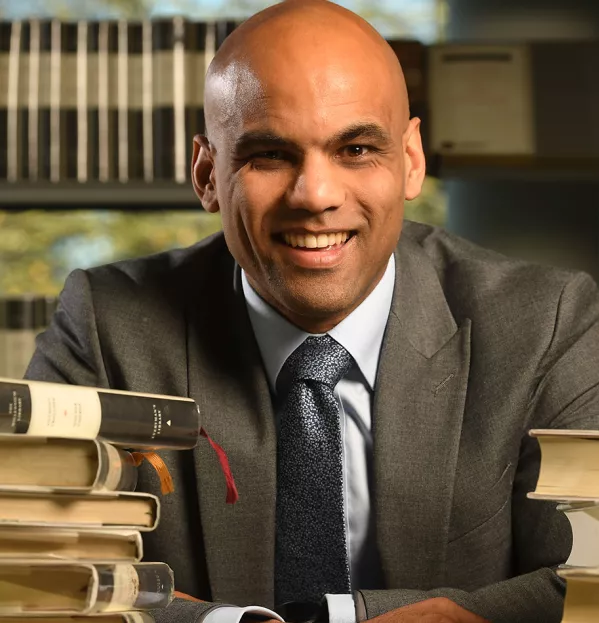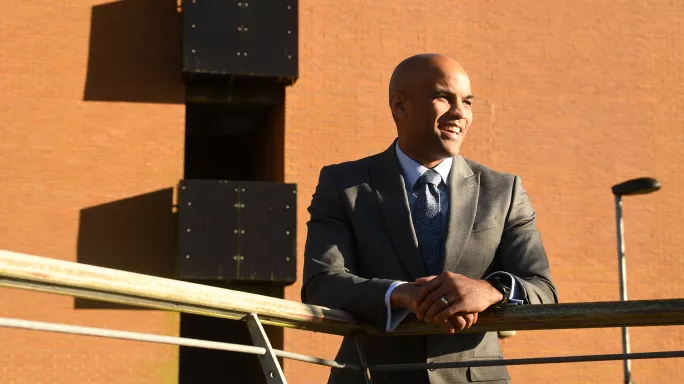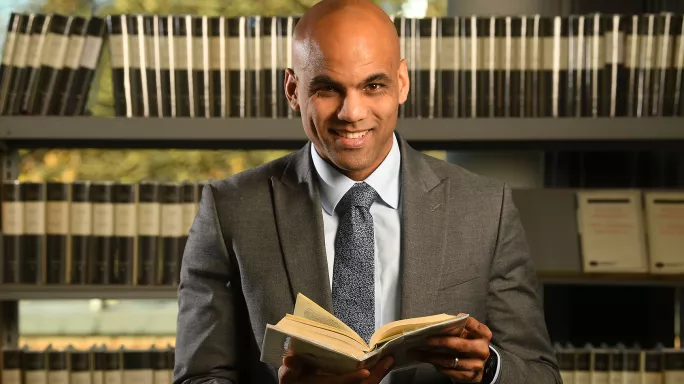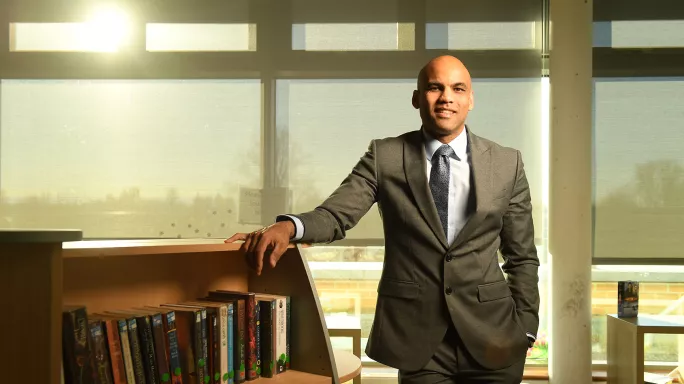10 questions with...Marcus Shepherd

Marcus Shepherd is education director at E-ACT and leading on a new project launched by the multi-academy trust to support the development of Black, Asian and Minority Ethnic (BAME) teachers into senior roles in education.
In recent years research has revealed “significant disparities” in the career progression of non-white teachers and their counterparts.
Answering Tes’ 10 questions, Shepherd speaks about why education is so important to him and his family, and why he believes the status quo in education is not acceptable and that failure should never be feared.
1. Who was your most memorable teacher at school and why?
That’s easy: Mrs Ford. She was my form tutor and history teacher. She held me to account and you could tell she wanted you to do well. She brought history to life and I would just honour every word.
Looking back, because of my background, I now understand how important it was that I had people that had really high standards for me, because many had lower expectations and that could have led to me not achieving my potential or going down a different path. Even now I use some of the things that Mrs Ford taught me: not just history but lessons in how to behave...I model my teaching approach on her.
2. What were the best and worst things about school?
My mum made sure education was front and centre, and I understood early on that was going to be my vehicle to better myself and my family. I enjoyed the challenge of learning and engaging with all the lessons. My world view was pretty small - I lived in a small ex-mining town and never really went anywhere. Seeing success from my GCSEs and A levels was important.
- Career progression: “Invisible glass ceiling” blocks teachers of colour
- Equality: “Significant disparities” in career progression for non-white teachers
- Diversity: Most primary schools have no ethnic minority teachers
It’s probably a bit of a cliche, but I didn’t really have any worst sides, although school dinners weren’t particularly great! Retrospectively, I look back now and in terms of enrichment and extracurriculars, some schools were fairly limited. There were some limited opportunities to broaden your horizons and engage with enrichment opportunities that I think are probably more available now.
3. Why do you work in education?
I never thought I was going to be a teacher. Right the way up until my final year of university, I wanted to work in finance. I remember going to interviews in these finance companies, just thinking, “My personality doesn’t work here.” So I signed up to Teach First thinking that I might just do two years and then move on to something else.

And the reason I’m still in education is because of the first lesson I taught. I remember that moment - I had such a buzz. And I just remember sitting there thinking: “I want to do this for a long time, I want to have an impact on young people.”
4. What do you regret and what are you proudest of?
I don’t regret anything. I think what I’ve learned is that difficult times are when you do the most learning. I think too often people worry about being defined by failure.
You don’t want to be comfortable in failure, but you don’t want to be scared of it. Because if you’re scared of it, you always live in comfort and living in comfort is not normally where you will have the biggest impact. Comfort keeps the status quo in place, but actually in education, the status quo isn’t acceptable for a number of reasons, such as inequalities, class, race and gender.
To have an impact, you’ve got to be prepared to fail. You don’t have to accept it. You should never accept it. You should never want it, but you shouldn’t fear it.
I was really proud when I became a principal in leading two schools and really redefining those schools. And then, as I’ve segued into executive leadership, my success now is about developing other leaders.
The programme that I’m leading on at E-ACT is also something I’m personally proud of because I believe that my role now is to help other people and open doors.
5. What are the best and worst aspects of the school system?
I think the best aspects of the school system are the kids and the staff. They’re so resilient.
Teachers are working in increasing levels of accountability, decreasing resource, increase in expectations...and they do it every single day because they care deeply about young people and helping them.

The problem with education is it constantly becomes political, but it should be apolitical. There should be a cross-party committee that has a long-term strategy for education. What it can’t be is a political football that changes based on who is in power, because young people have only got one chance.
6. What will our schools be like in 30 years’ time?
I think artificial intelligence will probably be involved in specialist areas that students are becoming more interested in that maybe we don’t have the expertise for in schools - for instance, Mandarin. Not many schools can find an expert to teach that, but I’m imagining that with technology soon we’ll be able to source that better. What won’t change is the need for human interaction and relationships.
7. Who would you have in your perfect staffroom?
I’d surround myself with the teachers that inspired me at school. So Mrs Ford, Mr Wilson, Mr Chamberlain, Mrs Shepherd. They were people that moulded me into the person I am today. I think a staffroom that has those people, the qualities they had - I’d want to surround myself with those people and also to be able to say thank you to them.
8. Your own teachers aside, who has influenced you the most in your life?
My current boss has been a real mentor for me: Pete Kirkbride, who is the national director for secondary education at E-ACT. I’ve worked with him now for nearly four years. In leadership you need a mentor. You need someone who is going to support you, develop you, train you and hold you to account. Someone to tell you when you’re being immature, when you’re being mardy, when you’re being petulant, but also tell you when you get it right.

Pete has understood the challenges that I face. Being a leader of mixed heritage brings about its challenges, and it’s something that he’s always worked hard to understand.
9. If you became education secretary tomorrow, what would you change?
I’d take a long-term view of education. I’d reach out to the opposition and all the other parties and say, “Our young people’s education is more important than party lines and politics. So we now need to come up with a cross-party approach that we all agree on and are all invested in.
“A bit like a senior leadership team, you may not agree with every aspect of a decision, but you do that behind closed doors. But once we agree, this is the way forward.”
10. Who has made the biggest difference to education in the past 12 months?
The most dangerous phrase in education is when people are asked what they do and they say, “I’m just a teacher.”
What we’ve got to be careful of is that we don’t create a hierarchy where we idealise certain people. Actually the people who have the biggest impact are those teachers who every single day go out there and deliver lessons against a backdrop of uncertainty, of political change, economic change and a cost-of-living crisis.
You need a Tes subscription to read this article
Subscribe now to read this article and get other subscriber-only content:
- Unlimited access to all Tes magazine content
- Exclusive subscriber-only stories
- Award-winning email newsletters
Already a subscriber? Log in
You need a subscription to read this article
Subscribe now to read this article and get other subscriber-only content, including:
- Unlimited access to all Tes magazine content
- Exclusive subscriber-only stories
- Award-winning email newsletters
topics in this article



